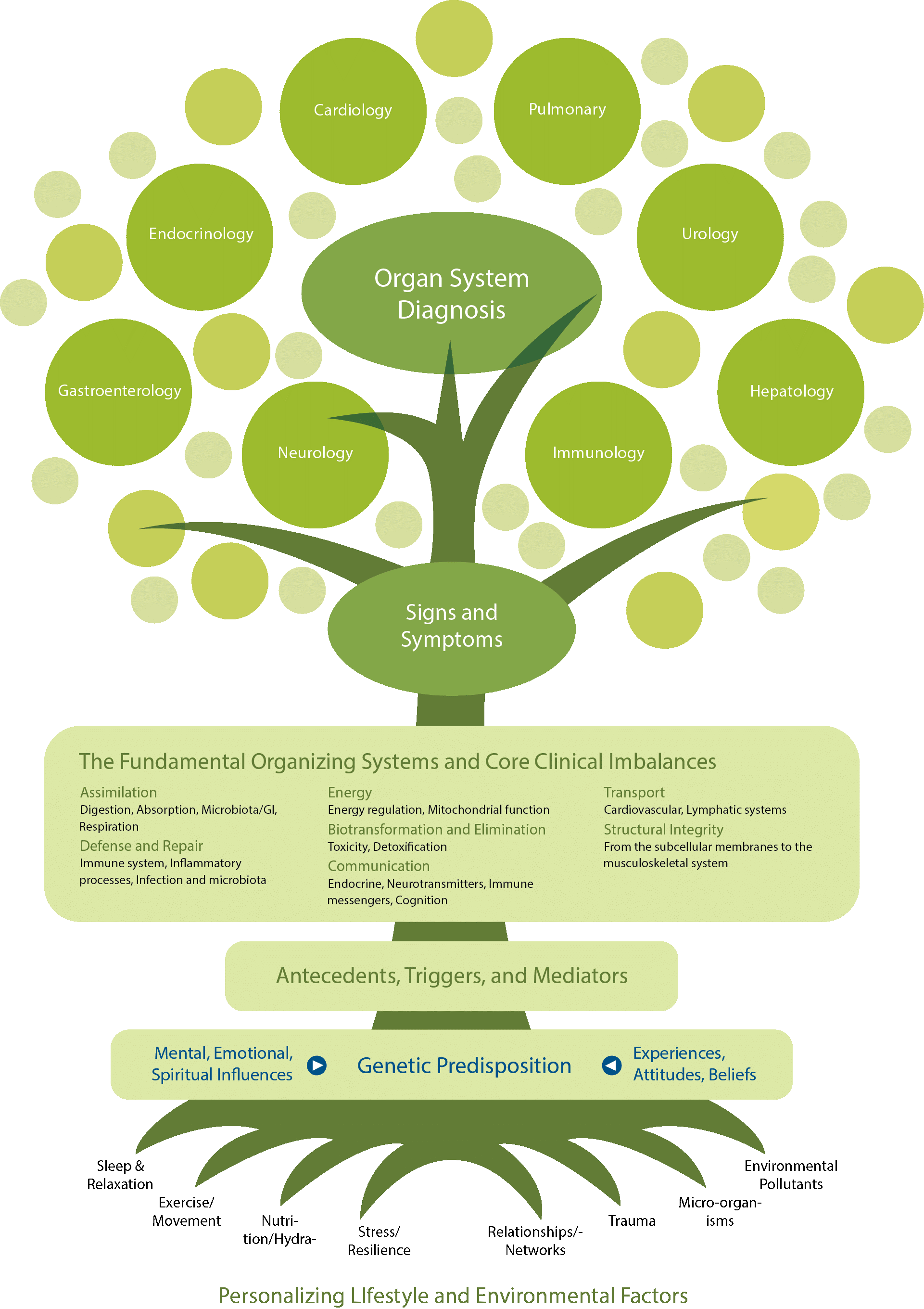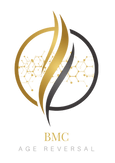At BMC Clinic,
We emphasize personalized care tailored to individual needs.
Focus on prevention and long-term health.
Addresses; the root causes of health issues, potentially leading to more sustainable outcomes.
We help the patient in the best way to improve health span & Life span.
OUR PROGRAMS

FUNCTIONAL MEDICINE
Principles of Functional Medicine
Patient-Centered Care: Functional medicine practitioners focus on the patient as a whole, considering their history, lifestyle, and genetic background to tailor personalized treatment plans.
Holistic Approach: The approach considers all aspects of a person’s life, including diet, sleep, stress, and exercise, to understand how these factors impact health.
Interconnected Systems: It views the body as an interconnected system rather than a collection of independent organs. For instance, it explores how imbalances in the gut can affect overall health.
Prevention-Oriented: Functional medicine emphasizes preventing disease before it occurs by promoting healthy lifestyle choices and early interventions.
Use of Evidence-Based Practices: While incorporating various treatment methods, functional medicine is grounded in scientific research and uses evidence-based practices to support its recommendations.
How Functional Medicine Works?
Comprehensive Assessment: Initial consultations often involve an extensive review of medical history, lifestyle, and environmental exposures, at BMC Clinic we have a sophisticated software in Functional Medicine that helps to record the issues mentioned, as well as initial and detailed laboratory tests to uncover imbalances or dysfunctions of the body.
Personalized Treatment Plans: Based on the findings, practitioners develop individualized plans that may include nutritional advice, supplements, stress management techniques, exercise, and medical treatments scientifically proved to address all the possible causes of the fast aging and possible degenerative diseases.
Collaboration: Functional medicine practitioners often work in collaboration with other healthcare specialists to ensure a comprehensive approach to patient care. Every day we have a medical meeting discussing the cases with the medical staff and nutritional support.
At BMC Clinic:
We emphasizes personalized care tailored to individual needs.
Focuses on prevention and long-term health.
Addresses the root causes of health issues, potentially leading to more sustainable outcomes.
We help the patient in the best way to provoke health span & Life span.
In summary, functional medicine aims to create a comprehensive understanding of a patient’s health by addressing the root causes of disease and promoting optimal wellness through personalized, integrative care.
ANTI-AGING MEDICINE
The mission of age-reversal medicine is to enhance and extend human life by slowing down, preventing, or reversing the processes associated with aging. We are seeking to not only extend lifespan but also to improve the overall quality of life by addressing age-related health issues.
The goals of anti-aging medicine include:

Understanding the Aging Process: Age-reversal medicine aims to comprehensively understand the biological mechanisms that contribute to aging at the molecular, cellular, and systemic levels. This includes studying factors such as genetics, epigenetics, inflammation, oxidative stress, and metabolic changes.
Preventing Age-Related Diseases: Age-reversal medicine focuses on identifying and addressing the root causes of age-related diseases, such as cardiovascular disease, neurodegenerative disorders, and certain types of cancer. By targeting these underlying causes, the goal is to delay or prevent the onset of age-related diseases.
Promoting Longevity: While extending lifespan is a key objective, age-reversal medicine also emphasizes the importance of promoting healthy aging. This involves interventions that not only add years to life but also ensure that those additional years are characterized by good physical health, mental well-being, and functional independence.
Lifestyle Interventions: Lifestyle factors play a significant role in the aging process. Age-reversal medicine encourages interventions such as a healthy diet, regular physical activity, stress management, and adequate sleep to promote overall well-being and longevity.
Biogerontology and Geroprotectors: Researchers in anti-aging medicine explore compounds known as geroprotectors—substances that have the potential to slow down aging processes or protect against age-related damage. Understanding the biology of aging at a molecular level and the eleven hallmarks of aging is crucial for identifying and developing effective geroprotective interventions.
Precision Medicine Approaches: Recognizing that individuals age differently due to genetic and environmental factors, age-reversal medicine promotes personalized or precision medicine approaches. Tailoring interventions to an individual’s specific genetic and biological profile can enhance their effectiveness.
Innovative Therapies and Technologies: Age-reversal medicine involves exploring innovative medical interventions and technologies, including regenerative medicine, stem cell therapy, bio-Identical hormone replacement therapy, hyperbaric chamber therapy, IHHT therapy, ozone therapy, and emerging anti-aging drugs and functional nutrition supplements. These approaches aim to repair or rejuvenate tissues and organs affected by aging.
Public Awareness and Education: Age-reversal medicine seeks to raise public awareness about the importance of healthy aging practices and the potential benefits of anti-aging interventions. Educating the public about lifestyle choices and the latest scientific advancements helps empower individuals to take proactive steps in managing their health as they age.
It’s important to note that the field of age-reversal medicine is a subject of ongoing research and scientific and medical communities. While progress has been made, achieving the ambitious goals of extending healthy human lifespan and mitigating the effects of aging requires continued scientific inquiry, ethical considerations, and a commitment to rigorous clinical research.

REGENERATIVE MEDICINE
Regenerative medicine, an interdisciplinary field that applies engineering and life science principles to promote regeneration, can potentially restore, repair or regenerate diseased and injured tissues and whole organs.This field aims to harness the body’s natural ability to heal and regenerate, using advanced techniques to stimulate or enhance these processes. The ultimate goal is to restore normal function to tissues or organs that have been compromised due to injury, disease, or congenital abnormalities.
Key aspects of the regenerative medicine mission include:
Stem Cell Therapy: Stem cells have the unique ability to differentiate into various cell types, making them a crucial component of regenerative medicine. Researchers explore ways to harness the potential of stem cells to repair or replace damaged tissues. At BMC Clinic besides the Stem Cell Therapy we also work with Exosomes, Placental implants & extracts, NK (natural killer cells, dendritic cells, for cancer patients) and polypeptides.
Clinical Applications: Regenerative medicine extends to translating scientific discoveries into clinical applications. This involves conducting rigorous clinical trials to ensure the safety and efficacy of regenerative therapies scientifically adopted in medical practice.
Collaboration and Interdisciplinary Research: Regenerative medicine is inherently interdisciplinary, involving collaboration between scientists, engineers, clinicians, and other experts. We work shoulder to shoulder with the best certify laboratories in Mexico of Stem cells and derivates products, guaranteeing the highest quality of products and free of harmful substances
Patient-Centered Approach: The ultimate aim is to improve patient outcomes and quality of life. Regenerative medicine seeks to provide novel and effective treatments for a wide range of conditions, from degenerative diseases to traumatic injuries and cancer
By pursuing these objectives, the regenerative medicine community aims to revolutionize the way we treat diseases and injuries, moving from traditional symptom management to addressing the underlying causes and promoting true tissue regeneration. Our mission holds the potential to transform healthcare and significantly impact the lives of patients around the world.
PRECISION MEDICINE
Precision medicine, also known as personalized medicine, is an innovative approach to medical treatment that tailors healthcare to the individual characteristics of each patient. It considers factors such as genetics, environment, and lifestyle to develop personalized treatment and prevention strategies. The goal of precision medicine is to improve patient outcomes by customizing healthcare to the unique needs of each person.
The key components and principles of precision medicine:

Genomic Information: Precision medicine often involves analyzing a patient’s genetic makeup to understand how their genes may influence their response to certain treatments. This can include identifying genetic mutations or variations that may predispose an individual to certain diseases or affect their reaction to specific medications.
Biological age test: By providing a more accurate picture of an individual’s health and aging process, these tests can help tailor personalized health and wellness strategies.
Personalized Treatment Plans: Based on a comprehensive understanding of a patient’s genetic, environmental, and lifestyle factors, healthcare providers can develop personalized treatment plans along with functional medicine. This approach aims to select the most effective therapies with the least side effects for each patient.
Targeted Therapies: Precision medicine includes the development and use of targeted therapies that specifically address the underlying mechanisms of disease.
Predictive Analytics: By integrating data from various sources, including electronic health records, genomic databases, and environmental factors, precision medicine can help predict disease risk and progression. This allows for early intervention and preventive measures to be implemented before a disease fully develops.
Integration of Multidisciplinary Data: Precision medicine involves the integration of data from various disciplines, including genomics, functional medicine, age-reversal medicine and regenerative medicine to create a comprehensive profile of each patient. This holistic approach supports more accurate diagnoses and tailored treatments.
Ethical and Social Considerations: Precision medicine also addresses ethical and social issues related to genetic privacy, data security, and access to personalized treatments.
Overall, precision medicine represents a shift from a one-size-fits-all approach to a more personalized and precise strategy, enhancing the potential for successful treatment outcomes and improved patient care.
